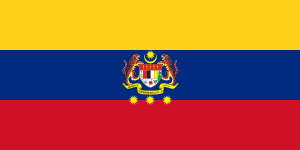| Sukma Games |
|---|
 |
| First event |
1986 |
|---|
| Occur every |
2 years |
|---|
| Purpose |
National multi-sport event in Malaysia |
|---|
| Last event |
2014 Sukma Games
in Kangar, Perlis |
|---|
| Games |
|---|
|
|
The Sukma Games is a sporting event in Malaysia, held once every two years. Sukma is an acronym for Sukan Malaysia; literally Malaysian Games, in other words this event is often viewed as a high-end national level competition and is usually referred to as the "Malaysian Olympics". The first Games was held in 1986 in Kuala Lumpur. The games have been held biannually since its inaugural event in 1986, although Kuala Lumpur hosted the games in 2011 and 2013 for optional sports of the 2012 edition and 2014 edition respectively, making it apparently held annually at those times. Participants of the event are picked from a competitive pool of possible strong elite athletes for each respective state and are usually extremely proficient and skilled in their own respective disciplines.[1]
Background
The Sukma Games is a multi-sports events held biannually and is the largest and prestige tournament in Malaysia. The tournament is held at every alternate year with Southeast Asian Games to explore new talents of the athletes highly potential to represent the nation at international sporting events.
The Sukma Games rose from the proposal of the then Minister of Culture, Youth and Sports, Anwar Ibrahim in 1983. At first, the proposal consisted of sports such as tennis, table tennis, cycling, athletics and volleyball, but due to popularity and fame, the sports and number of events increased.[2]
The Sukma Games concept is initiated to shape a united multi-racial society across the nation. The games fulfilled the Malaysia corporation concept where the government, sporting bodies, National Sports Council and non-governmental organizations are involved in managing its sponsorship.
Participating contingent
The Participating Contingent are mainly states and federal territories within Malaysia. Some national organisations and Foreign Affiliates have been invited to certain Sukma Games Edition. Eventually, as time passes all invitational teams except Brunei have been ceased to participate in any Sukma Games followed by individual Federal Territories of Malaysia which the latter had been merged into a single team starts 2006. Participating Contingent with their respective Sukma Games Code are as below.
Notes:
- ^ Brunei is the only contingent which is not from within Malaysia
- ^ Kuala Lumpur, Labuan and Putrajaya participated as a combined Federal Territory contingent since 2006
- ^ No longer participated in the games. (Historic Teams)
- ^ The Northern Territory of Australia has been invited to several Sukma editions. The territory participated for the first time in the 2002 Games.
Sports
The list below shows the sports that are played at all the Sukma Games since 1986.
Core sports
Optional sports
All-time medal table
Below shows the all time medal table of Sukma Games from 1986 to 2014. Defunct teams are highlighted in italics.
- Total medals excluding 4th place
Host state
Edition
Host cities of the games through 2016
All states of Malaysia have held their respective Sukma Games, except Kelantan.
| Edition | Year | Host | Main Stadium | Start Date | End Date | Sports | Events | Contingents | Competitors | Champion |
| I | 1986 |  Kuala Lumpur Kuala Lumpur | Merdeka Stadium, Kuala Lumpur | 19 April | 26 April | 15 | 127 | 17 | 4,552 | Kuala Lumpur |
| II | 1988 |  Kuala Lumpur Kuala Lumpur | Stadium Negara, Kuala Lumpur | 12 November | 19 November | 26 | 133 | 17 | 4,995 | Selangor |
| III | 1990 |  Sarawak Sarawak | Sarawak State Stadium, Kuching | 18 July | 27 July | 26 | 134 | 17 | 3,426 | Sarawak |
| IV | 1992 |  Johor Johor | Tan Sri Dato Haji Hassan Yunos Stadium, Johor Bahru | 1 July | 11 July | 26 | 199 | 17 | 5,151 | Sarawak |
| V | 1994 |  Perak Perak | Perak Stadium, Ipoh | 9 June | 18 June | 26 | 230 | 17 | 5,664 | Sarawak |
| VI | 1996 |  Pahang Pahang | Darul Makmur Stadium, Kuantan | 1 June | 10 June | 26 | 277 | 19 | 6,495 | Selangor |
| VII | 1998 |  Selangor Selangor | Opening ceremony
Shah Alam Stadium
Closing ceremony
Melawati Indoor Stadium | 17 April | 26 April | 26 | 264 | 16 | 5,028 | Selangor |
| VIII | 2000 | .svg.png) Penang Penang | Batu Kawan Stadium, Batu Kawan | 25 May | 4 June | 29 | 332 | 19 | 5,875 | Selangor |
| IX | 2002 |  Sabah Sabah | Likas Stadium, Kota Kinabalu | 5 September | 14 September | 27 | 347 | 20 | 5,324 | Selangor |
| X | 2004 |  Negeri Sembilan Negeri Sembilan | Tuanku Abdul Rahman Stadium, Seremban | 28 May | 6 June | 32 | 370 | 17 | | Selangor |
| XI | 2006 |  Kedah Kedah | Darul Aman Stadium, Alor Star | 24 May | 4 June | 31 | 370 | 16 | 4,882 | Selangor |
| XII | 2008 |  Terengganu Terengganu | Sultan Mizan Zainal Abidin Stadium, Kuala Terengganu | 31 May | 9 June | 31 | 406 | 15 | | Terengganu |
| XIII | 2010 |  Malacca Malacca | Hang Jebat Stadium, Paya Rumput | 10 June | 19 June | 33 | 437 | 15 | 9,237 | Terengganu |
| XIV | 2012 |  Federal Territory Federal Territory | KLFA Stadium, Kuala Lumpur | 2 June 2011 | 12 June 2011 | 44 | 508 (2011: 129, 2012: 379) | 15 | 9,196 (2011: 3,368, 2012: 5,828) | Terengganu |
 Pahang Pahang | Darul Makmur Stadium, Kuantan | 9 July 2012 | 16 July 2012 |
| XV | 2014 |  Federal Territory Federal Territory | Bukit Jalil National Stadium, Kuala Lumpur | 28 June 2013 | 7 July 2013 | 44 | 528 (2011: 132, 2012: 396) | 15 | 11,433 (2011: 3,618, 2012: 7,815) | Terengganu |
 Perlis Perlis | Tuanku Syed Putra Stadium, Kangar | 24 May 2014 | 4 June 2014 |
| XVI | 2016 |  Sarawak Sarawak | Sarawak State Stadium, Kuching | 22 July | 31 July | Future event |
| XVII | 2018 |  Perak[3][4] Perak[3][4] | Future event |
| XVIII | 2020 |  Johor (potential bid)[5] Johor (potential bid)[5] | Future event |
|
Best performing contingent
| Contingent | Champions | Runners-up | Third |
 Selangor Selangor | 7(1988, 1996, 1998*, 2000, 2002, 2004, 2006) | 4 (1986, 2008, 2010, 2012) | 3 (1992,1994,2014) |
 Terengganu Terengganu | 4 (2008*, 2010, 2012, 2014) | | |
 Sarawak Sarawak | 3 (1990, 1992*, 1994) | 5 (1988, 1996, 1998, 2000, 2004) | 3 (1986, 2002, 2008) |
 Kuala Lumpur Kuala Lumpur | 1 (1986*) | 2 (1990, 1994) | |
 Perak Perak | | 1 (2002) | 4 (1998, 2000, 2004, 2006) |
 Pahang Pahang | | 1 (2006) | 2 (1996, 2012*) |
 Federal Territory Federal Territory | | 1 (2014) | 1 (2010) |
 Johor Johor | | 1 (1992*) | |
.svg.png) Penang Penang | | | 2 (1988, 1990) |
- * = host
List of the Sukma Games' Sportsman and Sportswoman
Previously Adopted Systems
Fourth Place-Points System
From 1998 to 2006, Sukma Games adopted the Fourth Place-Points System to calculate the points collected by athletes for the contingent. It was also a measurement to a contingent's strength and as bonus awards to a contingent. The Sukma Games organiser, however, has a somewhat misleading practice of ranking contingent based on most points or most medals collected in the medal table and not the traditional most gold-most silver-most bronze ascending order and includes fourth place and total points collected in the medal table. The system was abolished after the 2006 Sukma Games. Note that the system applied only for local contingents and not invitational contingents such as Brunei and Northern Territory.
Points are calculated based on the Number of Athletes in an event as follows.
| Number Of Athletes | Gold | Silver | Bronze | 4th Place |
| Single and Duo | 5 | 3 | 2 | 1 |
| Trio and Above | 8 | 5 | 3 | 2 |
Annual Games System
On 27 May 2010, the Cabinet Committee for Sports Development (Malay: Jawatankuasa Kabinet Pembangunan Sukan (JKPS)) has decided that it should allow the states to rotate hosting the Sukma Games every even years and the National Sports Council itself every odd year to give chance for every sports competed and help the develop the sports in all directions and 'democratise' all the sports events.,[6] hence was dubbed the "annual games" system while the nature of the games itself is biannual. This, however has caused some states like Sarawak to lament on its so-called bad performance when the optional sports only Sukma Games held in the odd years was competed, while in fact they excel in the core sports only Sukma Games held by the states in the even years when it was competed.[7] For example, they fell to the bottom three with only 2 Gold in the 2011 games which involved only optional sports. But in 2012 Games in Pahang which involved only core sports, they won fourth place among the states competed. By combining the results of the 2011 and 2012 games, Sarawak is fifth place overall. This shows that some states might be weak in certain sports, but they are strong in the others. This makes the team strong by overall results or otherwise. Besides, the implementation of the system saw the states sports agenda fully packed, and lack of enough time to rest after a competition. Notably, Brunei did not participate in the optional sports games held in Kuala Lumpur, rather it participated only in the state held Sukma Games held in the even years as usual. The system was adopted from 2010 to 2014, and was abolished via a meeting.
See also
References
|
|---|
| | Global |
|---|
| | Olympics | |
|---|
| | Continental | |
|---|
| | Associations | |
|---|
| | Communities | |
|---|
| | Disabled sport | |
|---|
| | Professions | |
|---|
| | Youth and students | |
|---|
| | Other sport | |
|---|
| | | Regional |
|---|
| | Africa | |
|---|
| | Americas | |
|---|
| | Asia | |
|---|
| | Europe | |
|---|
| | Oceania | |
|---|
| | Inter-continental | |
|---|
| | | National |
|---|
| | Americas | |
|---|
| | Asia | |
|---|
| | Europe | |
|---|
| | Oceania | |
|---|
| | NCSG3 | |
|---|
| | | Historical1 |
|---|
| Pre Modern Olympics
(in chronological order, 1900BC–1852AD) | |
|---|
| | Alternatives to the Modern Olympics | |
|---|
| |
-
 Category Category
-
 List List
-
 WikiProject WikiProject
|
|

